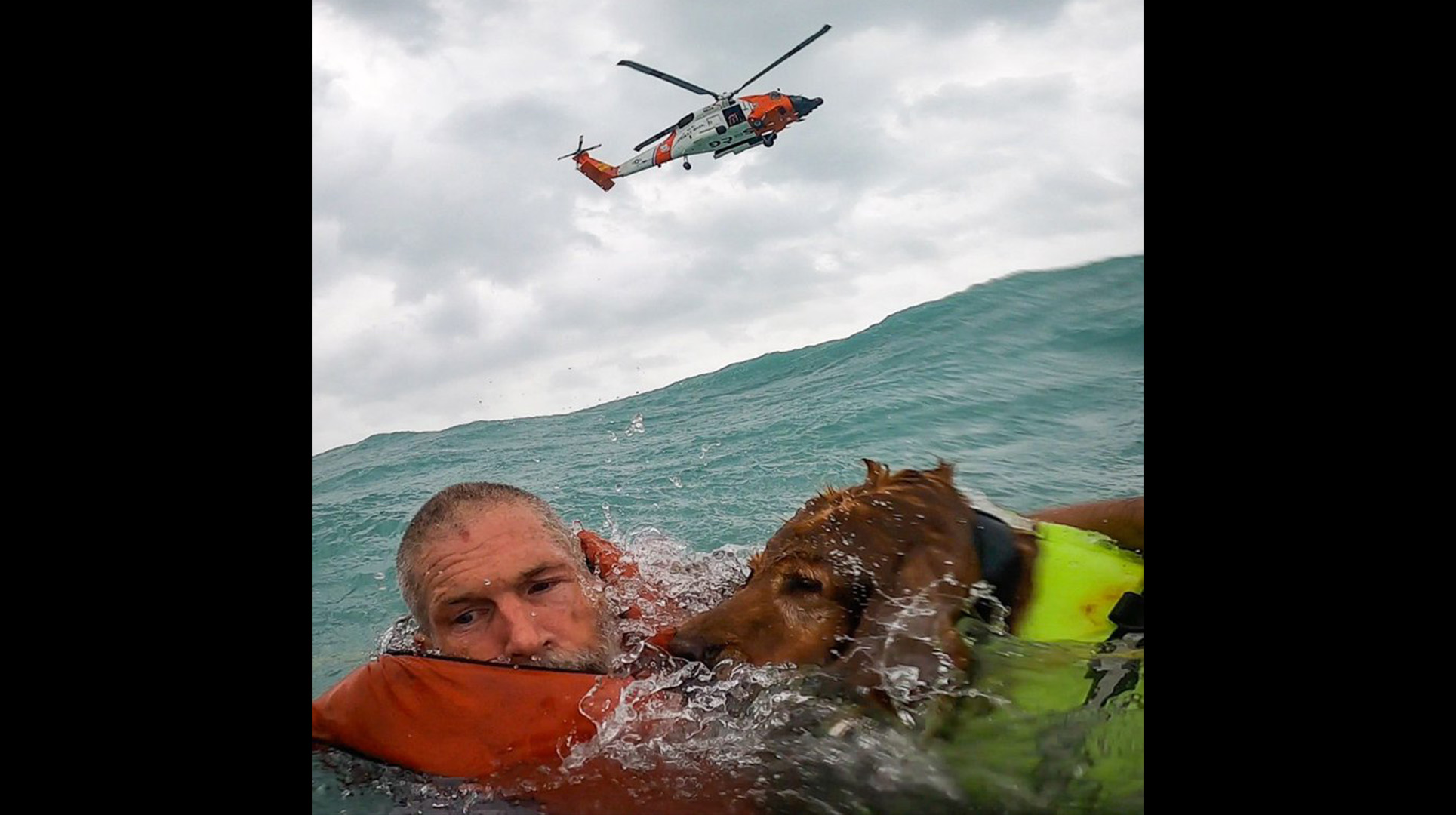
A Florida man’s decision to take his sailboat and his dog into Hurricane Helene ended with a mid-ocean rescue, but he got a heck of a selfie out of it.
Coast Guard officials in Florida released a remarkable mid-hurricane photo on Friday of a man and his dog in the middle of Hurricane Helene as a Coast Guard MH-60 Jayhawk helicopter hovers overhead with its cabin door open, indicating the helicopter’s crew is maneuvering toward his rescue.
Though the photo looks like a traditional ‘selfie,’ officials confirmed to Task & Purpose that the image is a video frame from the helmet cam of a Coast Guard rescue swimmer who reached the man in the water. In the full video released by the Coast Guard, the man and dog are still on their boat when a Coast Guard crewman arrives. They briefly jump into the water — the dog somewhat reluctantly — and swim to the helicopter’s hoist cable.
The man and his dog, Coast Guard officials said, were forced to abandon their sailboat about 25 miles off the coast of Sanibel Island early Thursday, directly in the path of Hurricane Helene, which made landfall in Florida Thursday as a Category 4 storm.

“He was trying to avoid the storm,” Coast Guard Petty Officer Third Class Eric Rodriguez said. “He was trying to head south, to stay away from that impact area but the width of the storm was dramatically larger than we have ever seen.”
As Helene approached southern Florida Thursday morning, the man’s 36-foot sailboat began taking on water. He radioed for help to Coast Guard watchstanders in St. Petersburg, Florida, at about 11 a.m., Rodriguez said. The station alerted a helicopter crew at Coast Guard Air Station Clearwater, just outside Tampa, who began planning the mission and weighing the obvious risks involved in reaching the man.
“We do a risk assessment prior to every evolution,” said Rodriguez. “Because if the rescue crews get hurt, then nobody gets rescued.”
Weather reports indicated that the heaviest weather of Helene was still a few hours off, though winds were already between 30 and 50 knots in the region. Still, with heavier weather ahead and the man’s boat foundering, the crew saw a chance.
“This was a very short window to ‘say, yes we can make this happen’,” said Rodriguez. “Had this been much later in the afternoon, I don’t think our crews would have been sent out for this rescue.”
Though helicopter rescues in hurricane-like conditions are rare and dangerous, they are within both the physical ability of the MH-60 helicopter and the training of Coast Guard aircrews. who regularly practice dealing with the many factors that huge winds create for flight.
Take-offs and landings can be sketchy while straight flight requires a sharp eye on fuel, as an aircraft burns much more gas than normal fighting its way into tropical-strength headwinds (though crews can make up some of the fuel loss on downwind legs). Even simple search patterns present problems, as normally tight, brief 180-degree turnarounds at the end of a search leg can be pushed miles off course.
However, the most skill is required when hovering over a survivor. To stay directly overhead in 50-mile-per-hour winds, pilots have to push the helicopter forward with enough power to match the wind just to stay in place, while adjusting their location left and right by just a few feet at a time.
And for the crew’s rescue swimmers, formally known as the Aviation Survival Technicians, wind-blown water and high waves can turn even routine rescues into a fight to survive.
“They take on the risk themselves knowing this is going to be quite dangerous,” said Rodriguez. “The conditions were still within our parameters to fly in and the crew decided this was something we were capable of doing.”
The Florida crew arrived over the man’s sailboat at about 2:30 p.m. Thursday, officials said, and sent down their rescue swimmer. The man and his dog then jumped into the water with the Coast Guard swimmer (the dog, wearing a canine lifevest, appeared to be against the idea and needed a solid push from his owner).
The helicopter then lowered a rescue basket, putting both the man and his dog inside it to be hoisted upwards.
Though the man appears to have a small injury on his nose in video from the rescue, he and the dog appear largely healthy inside the helicopter, where he and the swimmer exchange a high-five and shake hands. Neither the man’s man nor the dog’s was released.
“Every life is important,” said Rodriquez. “Whether it’s a person or a dog.”
